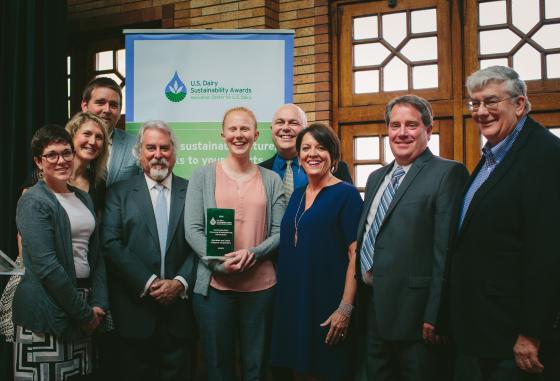Posted May 12, 2016 at 06:39am by Laura Hardie
Cabot Creamery Cooperative Receives National U.S. Dairy Sustainability Award for Real Farm Power™ Program

Cabot Creamery Cooperative has been recognized with a 2016 U.S. Dairy Sustainability Award for Outstanding Dairy Processing & Manufacturing Sustainability. The cooperative was selected for its Real Farm Power™ program which is the latest in a series of sustainability projects pioneered by the 1,200 dairy-farm families of Agri-Mark dairy cooperative, owner of Cabot Creamery Cooperative. The program takes a closed-loop approach, recycling cow manure, food scraps and food processing by-products to produce renewable energy on a Massachusetts dairy farm.
The Innovation Center for U.S. Dairy®, established under the leadership of dairy farmers, announced its fifth annual U.S. Dairy Sustainability Awards during a ceremony May 11 in Chicago. The program recognizes dairy farms, businesses and partnerships whose sustainable practices positively impact the health and well-being of consumers, communities, animals and the environment.
Real Farm Power™ reduces greenhouse gas emissions by 5,680 tons annually while generating 2,200 megawatt hours (MWh) of clean, renewable energy per year to offset the power needed to make Cabot™ butter. The $2.8 million project is expected to have a six-year payback, and it offers a blueprint for scaling anaerobic digester technology to small- and medium-sized dairy farms.
“Every year in the U.S. it’s estimated that up to 40 percent of all the food produced is thrown away — that’s 133 billion pounds of food,” said Jed Davis, Sustainability Director at Cabot Creamery Cooperative. “In partnerships with our farmers we’ve found a way to keep resources, like food byproducts, in a continuous cycle of re-use for as long as possible toward a goal of zero-waste-to-landfill.”
An example of the Real Farm Power™ program begins with Geissler’s Supermarket stores in Connecticut where food scraps are collected and delivered to Barstow’s Longview Farm, in Hadley, Mass.
At the farm, the organic material is put into an anaerobic digester that blends it with the farm’s cow manure and food processing byproducts from dairy processing, citrus processing, vegetable canning, breweries, sugar production and more.
In partnership with Vanguard Renewables, the renewable energy produced by the anaerobic digester is sent in the form of energy credits to the Cabot facility in West Springfield Mass., where the farm’s milk is processed, and offsets all of the energy needed to make Cabot butter.
“This process is the ultimate closed-loop recycling model – the food waste from the grocery store goes to Barstow’s Farm and is converted into power and natural fertilizer to make more food that ultimately returns to the grocery store, completing a full-circle cycle,” Davis said.
In total, the farm’s carbon footprint reduction is 5,680 tons per year, which more than offsets their emissions.
The farm receives 14,000 tons of organic food waste in total each year from 15 different food companies and the process is catching on with other manufacturers – a revolutionary step forward in recycling and re-using food waste in the U.S.
U.S. Dairy Sustainability Award winners were evaluated based on their economic, environmental and community impact, also known as triple-bottom-line success. The independent judging panel — including experts working with and throughout the dairy community — also looked for learning, innovation, improvement, scalability and replicability.
##
About Cabot Creamery Cooperative:
Cabot Creamery Cooperative has been in continuous operation since 1919, and makes a full line of cheeses, yogurt, sour cream, cottage cheese and butter. Widely known as makers of “The World’s Best Cheddar,” Cabot is owned by the 1200 dairy farm families of Agri-Mark, the Northeast’s premier dairy cooperative, with farms located throughout New England and upstate New York. For more information on Cabot, visit: www.cabotcheese.coop.
Cabot Creamery Cooperative is the world’s first cheese maker and dairy cooperative to achieve B Corporation Certification, a validation of its attention to environmental and social impacts on stakeholders.
